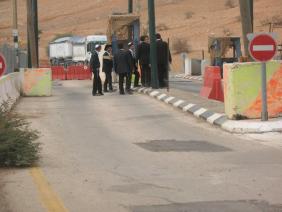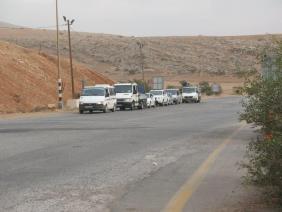Tayasir
13:15 We went through the Bezeq checkpoint.
Alon Road/Highway 578 – The earthen berm is in place; it’s been repaired and raised higher.

13:35 Hamra checkpoint
Six soldiers. Many vans transporting laborers and cars cross to the West Bank. Sparse traffic in the other direction. One lane from the west is blocked by red plastic barriers; one lane from the east is blocked by a water wagon. Suddenly a van appeared [“Beit She’an Transport”] and stopped at the checkpoint. About ten young religious men in black suits, one boy and the driver and his helper got out. They removed a tray of doughnuts, formed a circle with the soldiers, sang and danced on the road to the checkpoint. Hasambo, the local dog, ran among the celebrants, frightening the visitors. So we also entered the space usually forbidden to us because of the excuse it’s “a closed military area.” The line of cars from the east grew longer. Occasionally a soldier let a car cross. Two jeeps (perhaps carrying officers) arrived. Again we heard people calling, “Give them doughnuts!! Give them!!” Then the guests announced they were leaving and drove east.
visitors. So we also entered the space usually forbidden to us because of the excuse it’s “a closed military area.” The line of cars from the east grew longer. Occasionally a soldier let a car cross. Two jeeps (perhaps carrying officers) arrived. Again we heard people calling, “Give them doughnuts!! Give them!!” Then the guests announced they were leaving and drove east.
14:10 We left.
14:35 Tayasir
We startled a band of cats today also; they leap from the large garbage bin. The two D9 bulldozers we saw last time stand in the same place, facing the abandoned base as if just waiting to clear it. One soldier warns us not to approach the bulldozers because valuable equipment had been stolen from them (and didn’t indicate what was stolen, or when). He said the bulldozers are there to be guarded by the soldiers. He was sent to tell us to leave: “Military area.” He wasn’t expecting our firm refusal; it confused him. Later he was ordered not to speak to us. A water tank sat next to the soldiers’ emplacement. The soldiers operating the pump told us they fill it at the Mehola junction. One barely spoke Hebrew; the other looked down at the road (he’s apparently ultra-orthodox and not allowed to look at women). Both were ordered to leave: “They’re leftists; don’t talk to them!!!” The letter we have from the army ended any argument over whether we’re permitted to stand at the checkpoints. Before showing it, when we asked to see a general order confirming the claim that this is a closed military area, he announced: “I’ll get one.” Then he reproached us: “It’s too bad that people I’m protecting come stab me in the back. Don’t you really have anything better to do than show up here? My job is to keep you safe from people trying to sneak knives through here…” He gave this speech at least twice until a soldier called to him, “They’re right; forget it!!”
Three cars stood on the road east. A few people sat on the road. Before leaving we went to find out what was going on with the cars. Two were empty; a family sat in the third. A young man said they’d taken his ID and hadn’t yet returned it. We took his phone number because we were afraid he’d be harassed. A military jeep showed up as we were leaving. We waited down the road for about 20 minutes, until 15:30; the Palestinian cars hadn’t appeared and we drove home.
15:50 Bezeq checkpoint.
Appendix:
Wednesday, 4.12.13
With the help of a friend who speaks Arabic we talked to the mother of the young man; she’d been with him in the car. She said they’d been released in the evening, - I don’t think it was before 17:30. We weren’t able to determine whether their IDs had been returned. The young man was told to go to the Salem DCO (we don’t know why); the family was told they were only permitted to stay for an hour whenever they went to their fields (?). I understood their lands were near Farasiyya, 25 minutes away from the checkpoint. I’ll try to find out more.
